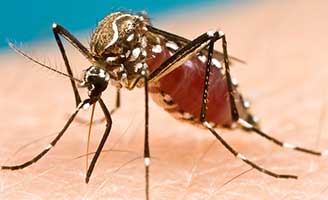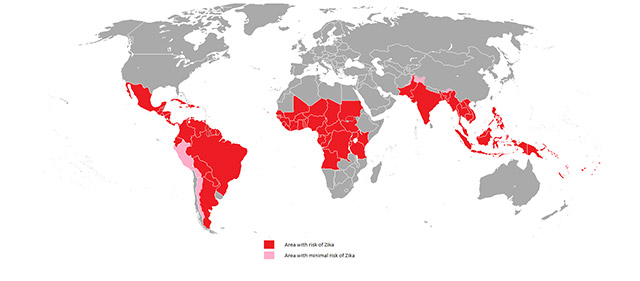Zika virus

Aedes aegypti mosquito (Copyright: Stephen Doggett, Westmead.)
Zika virus infection causes an illness known as Zika virus disease which shows symptoms such as a mild fever, rash, conjunctivitis and muscle or joint pain.
Since 1947, Zika virus activity was limited to parts of Africa, with occasional small outbreaks in Asia. However, it has recently spread to the Pacific Ocean, Central America, the Caribbean and South America.
How is Zika virus spread?
Zika virus is transmitted to humans through the bites of infectious female Aedes mosquitoes, most commonly Aedes aegypti, the same species that transmits dengue, chikungunya and yellow fever. Mosquitoes acquire the virus while feeding on the blood of an infected person and after around 10 days, an infected mosquito is capable of transmitting the virus.
The virus circulates in the blood of infected people for 2 to 7 days, at approximately the same time that they have a fever.
Where is Zika virus found?
Local outbreaks of Zika virus disease have been reported from tropical regions in Africa and Asia with activity recently spreading into the Pacific Ocean, Central America, the Carribean and South America – particularly Brazil and Colombia.
Local transmission of Zika virus does not occur in Western Australia. However travellers to the above regions should take care to avoid being bitten by mosquitoes.

Local outbreaks of Zika virus disease have been reported from tropical regions in Africa and Asia with activity recently spreading into the Pacific Ocean, Central America, the Caribbean and South America – particularly Brazil and Colombia. Read more about Zika virus on Healthy WA and the Australian Department of Health website (external site).
Read more about Zika virus when travelling overseas.
What are the symptoms?
Around one quarter of those infected by Zika virus will experience symptoms of the disease which may include:
- fever
- rash
- conjunctivitis
- muscle/joint pain
- general tiredness.
Symptoms occur within 2 to 7 days of being bitten by an infected mosquito.
Research suggests that Zika virus infection in women during the first trimester of pregnancy may also be linked to abnormal foetal brain development, known as microcephaly, which can result in permanent brain damage to the unborn baby.
Is there a treatment?
Currently there is no vaccine or specific treatment available to cure Zika virus disease. However, drinking plenty of oral fluids and paracetamol for relief of fever and body aches and pains may help to manage the disease.
Anyone who has travelled to countries where Zika virus is found and has returned home with an illness should seek medical attention. Zika virus infection is usually diagnosed through a specific blood test, after being referred by a GP.
How can Zika virus disease be prevented?
Only female mosquitoes bite humans and transmit the virus. Aedes aegypti commonly bites during the day in dark, protected indoor environments such as under tables, in closets, or behind curtains. Therefore it is important to avoid being bitten by mosquitoes and clean up to prevent mosquitoes breeding around your home.
Acknowledgements
Public Health